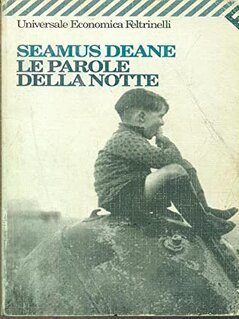Reflection: Enrico Terrinoni
We are grateful to Professor Enrico Terrinoni for permission to reprint his reflection, one that originally appeared in Il Manifesto in Italian on 14 May 2021 and in English, with the title "Seamus Deane: Singer of the Unjust World" on 28 May.
“It is strange that, in a fairly badly administered colony of the British imperial system, in the last two decades of the nineteenth century, there should begin to be produced a literature which is not only of a much higher level than anything that had previously been known, but that also ties up the question of linguistic expression with the political questions”. This was said by Seamus Deane in a Roman conference organized by Giorgio Melchiori in 1982, for the centenary of Joyce's birth.
Seamus Deane, the great critic who died on 12 May—the day of the death of the socialist James Connolly, shot by the British after the Easter Rising of 1916 —was among the first who placed the linguistic and political questions on the same level. As if to emphasize that the World exists only because we represent it through the Word—and it is no accident that the difference between the two words is a simple consonant: the "L" of Language.
Deane was born in Derry, Northern Ireland, in 1940. He first studied at St Columb's College, where he began a lifelong friendship with Seamus Heaney. He began his university career at Queen's in Belfast and completed it in Cambridge with a doctorate on the reception of thinkers of the French Enlightenment in England. From there he started a brilliant university career, spent between Berkeley, University College Dublin (alma mater of James Joyce), and then the University of Notre Dame.

Meanwhile, in Ireland, together with playwright Brian Friel, actor Stephen Rea and many others, he had founded a very ambitious cultural project which is still considered a turning point in contemporary Irish Studies: the Field Day company that would soon become a cultural laboratory of crucial importance. From this the first three volumes of the Field Day Anthology of Irish Writing directly edited by him would appear, followed by two other volumes focused on female writing. Seamus Deane was aware of the power of the Word, and he demonstrated it in poetry and fiction—his Reading in the Dark [in Italian Le Parole della Notte, published by Feltrinelli] is among the most profound and touching books in Irish literature of recent decades. But he did so even in his criticism, which has shaped the work of hundreds of scholars around the world. His work aimed at making it clear that the status of a population subject to colonization always highlights a marked difference.
He also coordinated large-scale projects. His role as General Editor of Joyce's works for Penguin—Deane personally edited Finnegans Wake—should be remembered. It was a project to which we owe a decisive shift of interest towards the Irish matrix in the study on the great writer.
Seamus Deane's career coincided with the successful attempt to restore an Irish dimension to many authors at first mistakenly considered only part of the British canon; and the fact that he came, not from the Republic, but from the North, from Derry, one of the centres of the conflict, added relief and a sense of purpose to his cultural battle.
Of his link with the city that was the scene of Bloody Sunday and other massacres, the Irish President Michael Higgins said: “To Derry he leaves the incomparable legacy of the life, the writing, the concerns, the despair and the hope, that he shared with its people and to which so much of the work would respond."
For Declan Kiberd, “Seamus Deane has left poetry, a novel and works of criticism that will stand the test of time. His poems and novel Reading in the Dark describe the cruel unjust world in which he was asked to grow up; and his writing became an alternative way of seizing power:
The unemployment in our bones
Erupting on our hands in stone;
The thought of violence a relief,
The fact of violence a grief
His criticism had a Swiftian indignation and was also, in its way, a protest against malformations of society and the personal life. Yet he always retained a sense of humour and found release in a sort of vituperative comedy, which was accompanied by a vigilant tenderness.”
Deane was for Ireland what Edward Said was for Palestine: a courageous intellectual, never far from the political arena, a staunch advocate of the duty of intellectuals to mingle; to get their hands dirty; and, occasionally, to change history.
Enrico Terrinoni is Full Professor Chair of English Literature at the Università per Stranieri di Perugia. Professor Terrinoni was a Visiting Fellow in Irish Studies at the Keough-Naughton Institute in Fall 2019 and a founder of the Institute's Global Ulysses initiative.